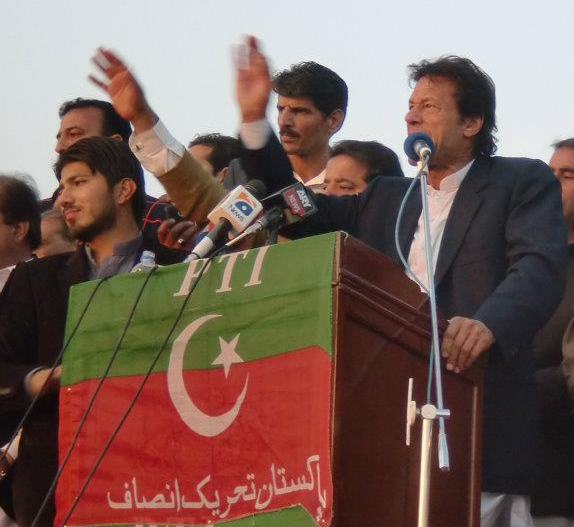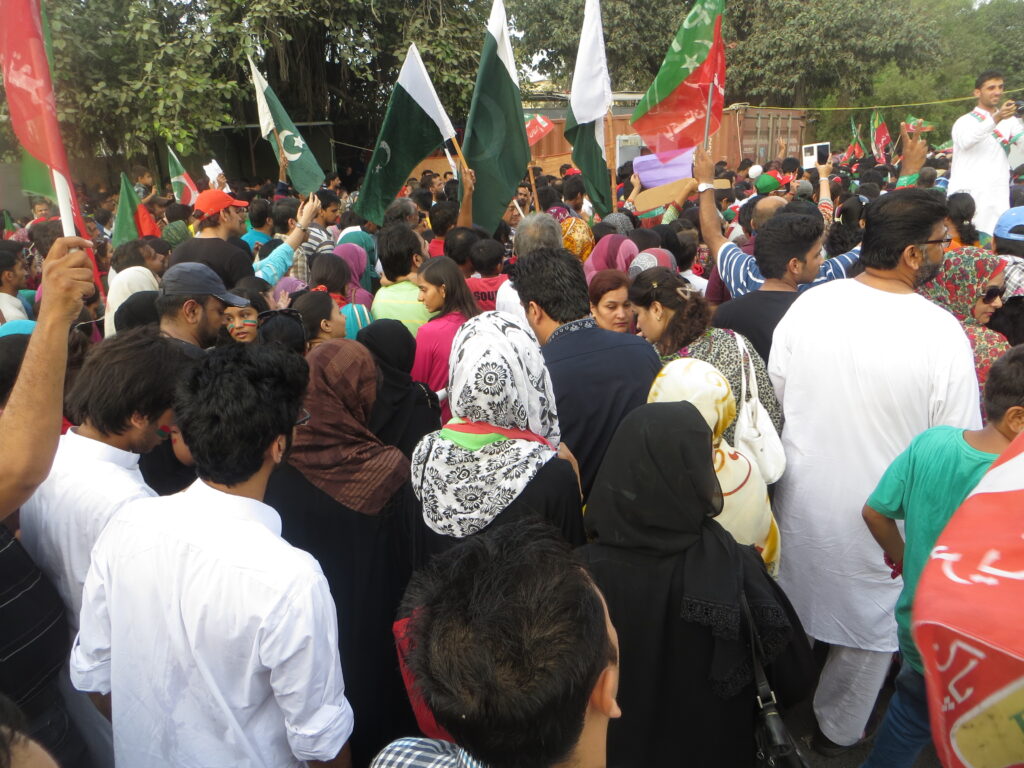
On May 9, Pakistan’s former Prime Minister Imran Khan was arrested on corruption charges outside the Islamabad High Court. As paramilitary forces took Khan into custody, political protests erupted throughout the country, which targeted military and intelligence installations among others. While Khan was released on bail three days later, escalating confrontations between Khan and Pakistan’s Army Chief Asim Munir has signaled potential for a clash between Pakistan’s powerful military and its most popular political leader.
In the lead-up to Khan’s arrest, Pakistan faced multiple crises. Since the vote of no confidence that removed Khan from office in April 2022, a political tussle between Khan’s Pakistan Tehreek-e-Insaf (PTI) on the one side and the coalition government, led by Prime Minister Shehbaz Sharif, and the military establishment on the other has seized Pakistani politics. Further, an economy on the brink of default has strained resources as terrorist attacks rise. With elections slated for later this year, Pakistan faces a challenging domestic environment.
“Nothing gets solved until the politics get resolved. And more worryingly, nothing may get solved even after the politics settles down.”
To learn more about the current situation in Pakistan, the South Asian Voices team sat down with journalist Cyril Almeida to discuss the significance of Imran Khan’s arrest, the political upheaval that followed, and implications for upcoming elections.
Q: Following Khan’s arrest last week, Pakistan faced resurging terrorist threats, an economy on the brink of default, and intensifying political polarization as elections approach. How do Pakistan’s manifold other crises intersect with the political events of the last week?
Nothing gets solved until the politics get resolved. And more worryingly, nothing may get solved even after the politics settles down. The triple crisis that Pakistan faces – economic, political and security – are deeply intertwined, to the point of being inseparable. Economic default, inarguably the greater threat at the moment, would instantly transform the politics of the country – and could even alter the state itself. But to avoid default – or even just break out of the prevalent boom-and-bust cycles with an inexorable downward trajectory – significant reforms will be required. Reforms that no government, civilian or military, has been able to pull off in the past. Assuming there is clarity on who will lead Pakistan over the next two or three years – itself a big assumption – will whoever has the reins be able to stop looking over their shoulder, fighting to tamp down threats to their political existence? The events of the last week suggest a political fight to the death. But Pakistan’s history and current events suggest that the military’s efforts to kill off a national political threat – Bhuttos, Sharifs, now Imran – are messy and unable to significantly erode public support.
Q: What do protests – both immediately following Khan’s arrest and those led by JUI-F in support of an independent judiciary – suggest about the nature of governance and the state?
In the main, the two set of protests demonstrate that a focus on numbers alone can be misleading. PTI has yet to develop a party infrastructure that can mobilize significant numbers of the public on short notice – even as it appears to enjoy the support of a significant swathe of the public. Meanwhile, JUI-F has an organized cadre that can be called upon instantly, but the party appears to be a declining political force with little traction among the wider populace. More interesting is to look at the impact of the protests. The PTI protests skipped past symbols and institutions of civilian governance and went straight for military targets. More than anything Imran Khan has said or the military has denied, the PTI protests demonstrated absolute clarity on where the fight lies at the moment: between the Imran Khan and the military leadership, with the civilian government mostly left to look on and cheer the military against its nemesis. The JUI-F protest, meanwhile, had the inadvertent effect of demonstrating the absolute power of the chief justice of the Supreme Court to essentially invent the law – recently, in favor of PTI and Imran Khan – if he so chooses without the possibility of meaningful censure or legal sanction.

Q: Pakistan has a long history of political turbulence. This crisis has witnessed interventions form the civilian government, military establishment, and Supreme Court. What role does each play? What are some historical parallels or precedents that shed light on the current situation?
Until now, 2023 had most closely resembled 1988 in terms of uncertainty. Back then, after the sudden elimination of dictator Gen Zia, it was not clear how the year would end. Would martial law be reimposed, would elections be held, would the clear favorites – Benazir Bhutto’s PPP – be allowed to win an election and govern? In 2023, too, there has been uncertainty on how the year will end. Who will be leading Pakistan, civilian or military; and if civilian, from PMLN, PPP or PTI; or could it be some fanciful, extended caretaker set-up that is often hankered for in anti-democratic circles? The military crackdown against the PTI in recent days suggests an anyone-but-Imran decision has been made, but can Imran raise the cost of keeping him out to the point where the benefit of retaining the others becomes less of an obvious choice? In transition years past – elections in 2018, 2013, 2008, 2002, etc. – it was more or less known who would end the year in the prime minister’s hot seat. This year, because Imran Khan has fractured the military and the judiciary and dominates the public, it is still unclear what dispensation will end the year in charge of Pakistan.
Q: The immediate aftermath of Khan’s arrest witnessed unprecedented street protests. On Monday, the military vowed to use the Pakistan Army Act to prosecute the protesters who attacked military facilities. How have escalating confrontation between Imran Khan and Pakistan’s military establishment impacted the upcoming election?
“Without the compulsion of the court and in the presence of collusion between the government, the military and the election commission, the exercise of elections could be postponed indefinitely.”
There is now a realistic question mark if elections will be held on time or at all. The non-elections in Punjab and Khyber Pakhtunkhwa after dissolution of the provincial assemblies has opened a constitutional door to Shehbaz Sharif continuing as prime minister under emergency provisions or an extended caretaker set-up, long beyond the constitutional limit of 90 days. The seemingly impossible has been made possible by the failure of the chief justice of Pakistan to in fact force elections after demanding they be held. Without the compulsion of the court and in the presence of collusion between the government, the military and the election commission, the exercise of elections could be postponed indefinitely. The harsh rhetoric of the military leadership and government since the protests against Imran’s arrest are electorally ominous. If military courts and other summary trials materialize, elections may also become a casualty. Alternatively, with the PTI pressed against a wall and Imran sidelined, the government may push ahead with snap polls to grab a majority in a tainted election. The year 2023 remains deeply uncertain on many fronts.
Also Read: What the Imran Khan Attack Means for Pakistan
***
Click here to read this article in Urdu.
Image 1: Imran Khan PTI via Wikimedia Commons
Image 2: Imran Khan Procession via Flickr


